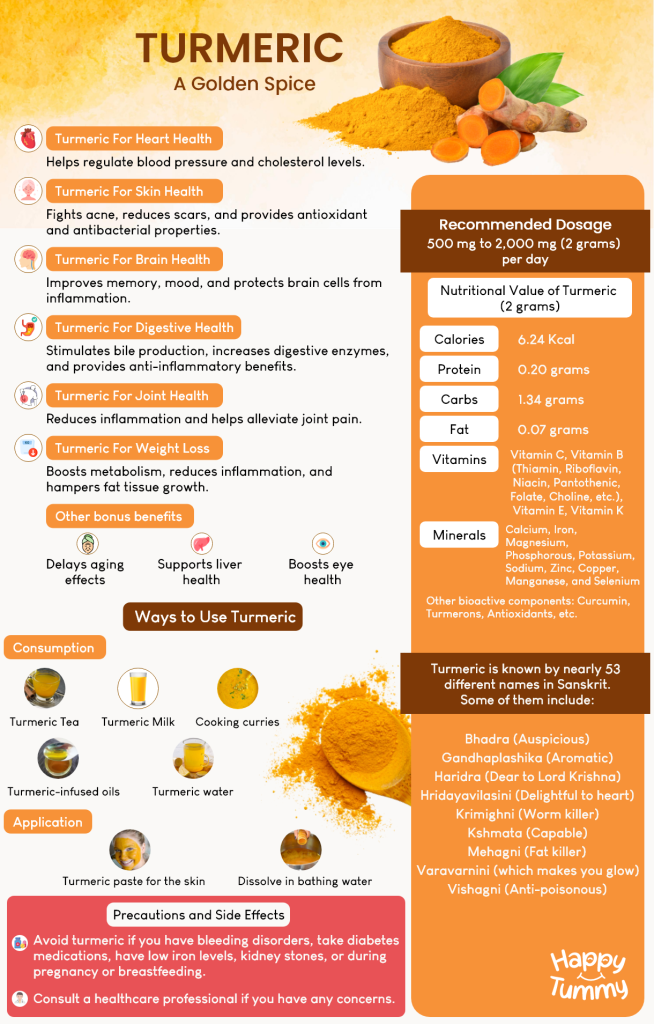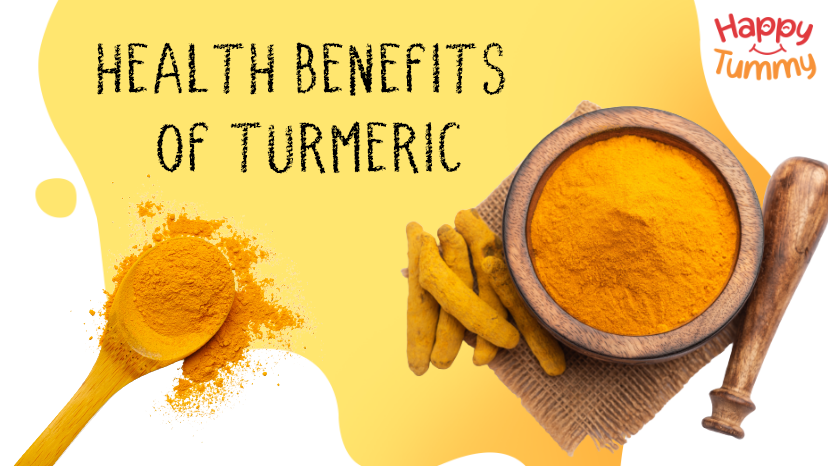Table of Contents
In the colourful tapestry of Indian culture and traditions, there exists a remarkable spice that holds a sacred place in our hearts and kitchens. Turmeric, known as “haldi” in Hindi, is more than just an ordinary ingredient; it is a symbol of prosperity, auspiciousness, and holistic well-being.
From our grandmothers’ age-old remedies to the vibrant festivities where it adorns our hands and faces, turmeric is woven deeply into the fabric of our daily lives.
You blindfold anyone and pick up a dish, and chances are, it might have turmeric in it. Such is its brilliance — glow-inducing, aromatic, sheer delight to the eye. And it is this brilliance that has heartened this article.
A reflection of good health, rich in antioxidants, healer, protector, a symbol of goodness, whatnot turmeric is.
A brief account of turmeric – nutritional and cultural
Once upon a time, Indian spices were much sought after. They were considered to be footsteps toward some hidden treasure. Although they still are considered precious, back in time the craze was sky-high. It led to the carving of the golden spice route. The route went from India to the Middle East to Europe at last. And the purpose? Sheer trade. The spices offered numerous health benefits. And turmeric was one of those spices.
Turmeric is an ancient spice, much ancient that its history dates back to some 4,200 to 4,600 years back. It was a part of Vedic culture. And from there, it went to China, to East Africa, to West Africa, to Jamaica, and then to the rest of the world. And this was not for its nutritional benefits but its functional benefits, meaning that it offered numerous medicinal and health benefits. [1][2]
Nutrition-wise, turmeric is not very calorie dense, considering the maximum amount we can consume in a day is tiny. Here is what it offers —
The daily recommended dose of turmeric is 500mg to 2 grams. Beyond 8 grams, side effects start manifesting. [3]
Ground Turmeric – Nutritional Value – 2 grams[4]
| Calorie | 6.24 Kcal |
| Protein | 0.20 grams |
| Carbs | 1.34 grams |
| Fat | 0.07 grams |
| Vitamins | Vitamin C, Vitamin B (Thiamin, Riboflavin, Niacin, Pantothenic, Folate, Choline, etc.), Vitamin E, Vitamin K, etc. |
| Minerals | Calcium, Iron, Magnesium, Phosphorous, Potassium, Sodium, Zinc, Copper, Manganese, and Selenium. |
| Other bioactive components | Curcumin, Turmerons, Antioxidants, etc. |
Such is the mystic spell turmeric holds that it has nearly 53 different names in Sanskrit. [5]
To give you an insight into it, here are a few names that this golden spice is known by:
- Bhadra – Auspicious
- Gandhaplashika — Aromatic
- Haridra – Dear to Lord Krishna
- Hridayavilasini — Delightful to heart
- Krimighni — Worm killer
- Kshmata – Capable
- Mehagni – Fat killer
- Varavarnini – which makes you glow
- Vishagni – Anti-poisonous
Surely, these names suggest goodness clad in gold. But this is only the surface. Studies have grown around turmeric, and their conclusions are auspicious indeed. The turmeric benefits are numerous, vouched, and brilliant. So, how does turmeric help us? Let’s have a look.
The terrific turmeric – its many benefits (backed by science)

From Vedic science to modern science, turmeric has stood the test of time. It is not just Ayurveda that scanned experiences and observations, modern labs confirm the benefits of these marvellous roots too. Here is what they say.
1. Turmeric for heart health
The heart is the heart and soul of our body. If it was not for the heart, love and romance from the world would have vanished. No more Shakespeare, no more Keats, no more humankind.
The heart takes care of not just numerous emotions (figuratively indeed), but it also keeps us alive. Turmeric has been found to be effective in improving heart health. It handles blood pressure and cholesterol like how Buddha handles the mind — in a good way. Cholesterol is not a bad thing, but bad cholesterol is. Our bodies have two types of cholesterol –
- Good cholesterol (HDL)
- Bad cholesterol (LDL)
Now, just as how goodness triumphs over evil, HDL reduces LDL in our bodies. And turmeric helps in doing exactly this same. [6]
Apart from it, turmeric also induces antioxidant properties. Antioxidants perform many heroic functions in our bodies. One of them is to provide the heart with goodness and protect it from diseases. Inflammation and oxidative stress mean troubles for the heart. Turmeric means all the troubles at bay.
2. Turmeric for skin health
Indeed, when the heart is healthy, the body stays young. And that very youth radiates upon the skin. However, we suffer from acne and breakouts due to several other reasons. But all these worries fade away when turmeric comes in.
Turmeric has been an innate part of beauty regime in many cultures, specially in India. The marriage is incomplete without the ritual of ‘Haldi’. It is a day that is given to enhance beauty and bring in luck.
It helps us when consumed or applied through its antioxidant and antibacterial properties.
The antioxidants in turmeric fight the free radicals (the damage-causing compounds). These free radicles are not a piece of good news for the skin. They bring in the havoc of wrinkles and breakouts. But this golden spice fights them off. Apart from it, turmeric also has several other skin-helping properties such as:
- Heals wounds and reduces scars
- Makes skin glow
- Fights off acne
- Soothes skin through anti-inflammatory effects [7]
3. Turmeric for brain health
The brain is as vital as the heart. Although turmeric cannot turn you into Einstein, it surely can help you walk a step or two toward it.
Studies have found that taking turmeric improved memory over a period of time. That too by a whopping 28%. Not only memory but mood was also improved. How wonderful! [8]
Turmeric is true gold when it comes to fighting depression.
The memory-preservation happens because turmeric has neuroprotective properties. This simply means the neurons that contain memories are protected from any harm. But this is not all. Furthermore, its anti-inflammatory properties protect brain cells and neurons from getting damaged due to inflammation, which comes uninvited with age.
4. Turmeric for digestive health
When it comes to digestion, turmeric is a double-edged sword. Take in the right amount, and it will help. Go over the bar, and it will worsen your digestion. But this is the case with any medicine on earth. One must know what the right amount is.
The daily recommended dosage of turmeric is anywhere from 500 mg to 2 grams.
When turmeric is taken in the right way and amount, it helps in keeping the stomach happy in many ways.
Most of the time, indigestion happens due to not enough bile juice and digestive enzymes. Both bile juice and digestive enzymes help break down food. Their lack means food passes through the digestive tract without any processing. Consequently, poor nutrition takes place. The body suffers from a lack of energy. Now, Turmeric helps in stimulating the liver into producing enough bile juice. [9]
Not only this, but it also helps increase the number of digestive enzymes.
Apart from it, turmeric also has anti-inflammatory and antioxidant properties. These properties keep the digestive tract in good shape. Overall, turmeric can help you enhance your digestive health. It can be your ‘Krimighni’, as is called in Sanskrit, your worm-killer.
5. Turmeric for joint health
We rarely want to age unless given the grace of pain-free immortality. It’s because it comes with a sea full of troubles. Your movements start to shrink; skin starts wrinkling down; and joints? Joints suffer from pain.
This is a usual case. And why it happens?
Because of inflammation.
This inflammation is a worry of all ages. But turmeric can be of some help. It can help make ageing a graceful process rather than a painful process.
Turmeric has anti-inflammatory properties. Due to this, it stops our bodies from falling down in unnecessary inflammation. We just saw how it helps the brain by putting a halt to this process. This same stands true for joints as well.
6. Turmeric for weight-loss
Modernism and weight management have been running hand in hand for a long long time. And the reason? Poor nutrition, fast food, even faster stress, and whatnot.
However, recently the air has been changing its way. The awareness of health and nutrition is enlightening the world. And turmeric is a helpful spice in this.
Although turmeric doesn’t directly make your body reduce weight, it creates an environment that becomes conducive to weight loss. We’ll tell you how.
- Inflammation holds the upper hand in helping obesity win. Now, curcumin, an active bio-compound in turmeric, has anti-inflammatory benefits. [10]
- Poor metabolism means poor energy management, which further means the body turns food into fat rather than energy. The solution? Eating foods that enhance and elevate metabolism. Turmeric intake boosts metabolism in the human body. Good news for health and bad news for fat. [11]
- And then, turmeric hampers the growth of fat tissues as well. What a wonderful and spicy world!
But to enhance the effect of turmeric, you must also consume black pepper with it. Why?
Taking black pepper along with turmeric helps the body absorb turmeric excellently. One study showed an increase of a whopping 2000%. [12]
7. A few other bonus turmeric benefits
When we speak of something as a gem, we expect it to be an elixir. So how can turmeric stop after providing 6 benefits? Indeed, there is much-hidden richness in this golden world. And how much?
- This ancient potent spice shows enough potency in delaying ageing effects. It aids longevity.
- Furthermore, it helps the liver get a breeze of invigoration.
- Its antioxidant, anti-inflammatory, and antibacterial properties also help the lungs with better health.
- And if you think this is all, know that curcumin also boosts eye health. This is another good reason to consume it so you could sneak at your friend’s phone from the corner of your eye, and that too with clarity.
Great right? But anything great can easily be noxious if handled incorrectly. So, what are the precautions you must take while shaking hands with turmeric?
Turmeric — precautions and side effects
First thing you must do while consuming turmeric is to chant every day that you won’t overconsume it. The recommended dosage has been set around 500 mg to 2,000 mg (or 2 grams). Apart from it, there are a few other things to know. First things first, who should avoid turmeric?
- If you have bleeding disorders such as slow blood clotting after an injury, avoid turmeric. It hinders blood clotting.
- People taking diabetes medications should consult their doctors first.
- If you have less iron in your body, then again, consult your doctor.
- People suffering from kidney stones should avoid it as well.
- Consult your doctor if you are a pregnant or breastfeeding mother.
Apart from it, you are good to go with this potent spice.
How to use turmeric?
There are two ways to use turmeric- consuming it and application.
To consume turmeric, the ways are umpteen. Here is how you can cherish its many benefits:
- Brew beverages like turmeric tea or make golden milk
- Use it while cooking curries and other dishes
- Drink turmeric water
- Buy turmeric extracts and other supplements
- Use turmeric-infused oils
- The most popular method- use it in cooking.
Application of turmeric
- Make turmeric paste and use it on the skin
- You can mix turmeric with chickpea flour, curd and rose water to make a paste and apply it for instant radiant clean skin.
- Because it has anti-bacterial properties, it is also dissolved in bathing water.
Now remember, always use good quality turmeric for both consumption and application. Like the Aashirvaad Turmeric Powder which is sourced directly from farmers and is completely natural and sun-dried.
Conclusion
Nature contains everything – the maladies and their remedies. And in this deep and dense nature, turmeric is no less some magical plant that grows in the hidden lush. But unlike a hidden plant, it is commonly available. And it is a good thing. A big relief indeed.
Turmeric is recently rising and reaching the ears of health enthusiasts. This potent spice has remarkable benefits. It offers a helping hand in managing weight, has numerous properties that help skin, heart, brain, joints, and whatnot, and is also used to flavour dishes as well. However, it must be consumed with wary. Make sure not to leap the 2,000 mg mark per day. Also, see if you have issues with blood clotting, diabetes, kidney stones, iron deficiency, etc. In these cases, just remember to consult with your healthcare professional
So, what are you waiting for? Go and sprinkle some turmeric into your next meal and embrace the potential benefits it has to offer. Your health and taste buds may thank you!
FAQs
Yes, it is generally safe to take turmeric daily as part of a balanced diet. It is important to note that individual responses to turmeric may vary, and some people may experience gastrointestinal discomfort or other side effects.
Turmeric does possess mild blood-thinning properties, primarily due to its active compound, curcumin. It can inhibit blood clotting to some extent, which may be beneficial for those at risk of blood clots. However, it is important to exercise caution and consult with a healthcare professional, if you are already taking blood-thinning medications.
Common side effects may include gastrointestinal issues such as stomach upset, bloating, gas, or diarrhea. These side effects are typically mild and temporary. However, individuals with gallbladder problems or those prone to kidney stones may need to moderate their turmeric intake, as excessive amounts could potentially worsen these conditions.
Yes, turmeric has the potential to cause gas or bloating in some individuals. This can be attributed to its natural compounds, including curcumin, which may stimulate the production of stomach acids and increase the flow of bile.















